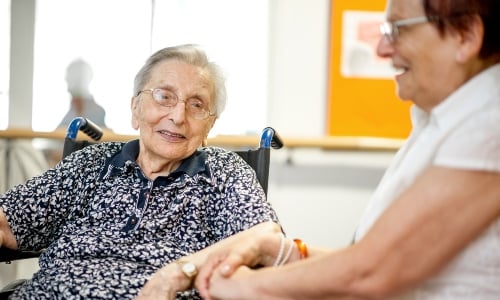Addressing loneliness among older people is an essential part of Age UK’s work.
Our new report on the topic, ‘You are not alone in feeling lonely’, recaps our learning to date about what works and shares a range of case studies that highlight the breadth of ways local services have sought to respond.
Alongside the report, we launched a new information guide, ‘Feeling lonely?’, to support older people and their friends, families and carers.
Isolation during the Covid pandemic raised the alarm about the dangers of loneliness and pushed it into public conversation – but momentum to drive change has since slowed. Sadly, data analysis shows that if we don’t tackle loneliness, there will be 1.2 million people over 65 in England often feeling lonely by 2034. This has far-reaching consequences for older people’s physical and mental health.
Key findings
-
940,000 older people (aged 65+) in the UK are often lonely.
-
270,000 older people (aged 65+) in England go a week without speaking to a friend or family member.
-
People who go a week without speaking to a friend or family member are almost three times more likely to be lonely than people who speak to friends and family more often.
-
Loneliness is linked with accelerated frailty and increased risk of several diseases – including a 29% increase in risk of incident coronary heart disease and a 32% increase in risk of stroke.
- 19% of carers aged 65+ (around 287,000 people) felt lonely because of the care or support they provide.
Offering a menu of approaches
The good news is that the examples in this report, along with many others up and down the country, are a real cause for optimism – showing that, with sustained investment in the right approaches, it’s possible to make a positive difference to older people’s lives.
Befriending services are the most frequently provided services designed to manage or reduce feelings of loneliness – and the ones local Age UK charities report as being the most popular and effective. But the research underpinning the report also reveals just how varied people’s needs and experiences are. There isn’t a ‘one size fits all’ solution to this challenge, so we have to get creative to help people develop their own pathways out of loneliness.
Loneliness is a complex challenge. Lots of us feel awkward talking about our emotions, and loneliness can be a particularly difficult subject to navigate. People experiencing loneliness often don’t recognise it themselves – and when they do, stigma, low confidence and a lack of information can prevent them from accessing available services. Sensitive methods are needed to identify and support lonely people, without attracting the stigma associated with loneliness interventions.
The psychology of loneliness
The report also highlights the important link between loneliness and our thought processes. Most traditional views of loneliness focus on a lack of relationships. However, how we experience our situation subjectively is also important. There’s growing interest among experts about the need for psychological approaches to help people change their ways of thinking about their social connections.
Psychological approaches offer a way for services to help to tackle these challenges. There isn't a 'right' way to have this kind of conversation. Instead, the approaches start from the understanding that what helped one person might not help another – but hearing about different ways other people have managed their own loneliness can help someone reflect on their own situation. The important thing is to let people know that there’s help available when they’re ready.
We have free resources available
Our website has a host of public resources available that can be used to learn more about loneliness and signpost people to the support they need.
Cultural belonging and loneliness
Cultural differences mean that support aimed at the general population will not always reach or engage some older people – for example, people from minoritised ethnic communities, people from immigrant communities or older LGBT+ people.
This has been described as a type of ‘cultural homelessness’ where a person may find that the people around them don’t have the same upbringing or background. It can lead people to feel or be misunderstood, or be hesitant to share those unique parts of themselves with others.
This highlights the importance of inclusive groups that recognise and celebrate diversity, reflecting different values and culture and being sensitive to different needs. Extra efforts need to be made to resource interventions to close these ‘loneliness gaps’ and ensure inclusion for all older people.
As Norman, 74, reflects: “Groups like Out In The City are needed because there are so many older, isolated people about… it has been a lifeline. I’ve made so many new friends. We all get along with each other, we all support each other. And it’s wonderful - it gives you something to look forward to. It has helped me relax and be myself.”
Small gestures make a big difference
As daunting as this challenge can seem, this work reminds us that we shouldn’t underestimate the apparently small things that make a huge difference, particularly when someone’s feeling low. A warm welcome, gentle encouragement and active listening all matter greatly. And as incredibly important as foundational services are, people who are enduringly lonely often need very sensitive and ‘loneliness literate’ support early on. These individualised approaches should come before and provide a way into more commonly recognised loneliness interventions.
Loneliness drains the joy out of life for far too many older people – but our learning shows that it doesn’t have to be this way.






